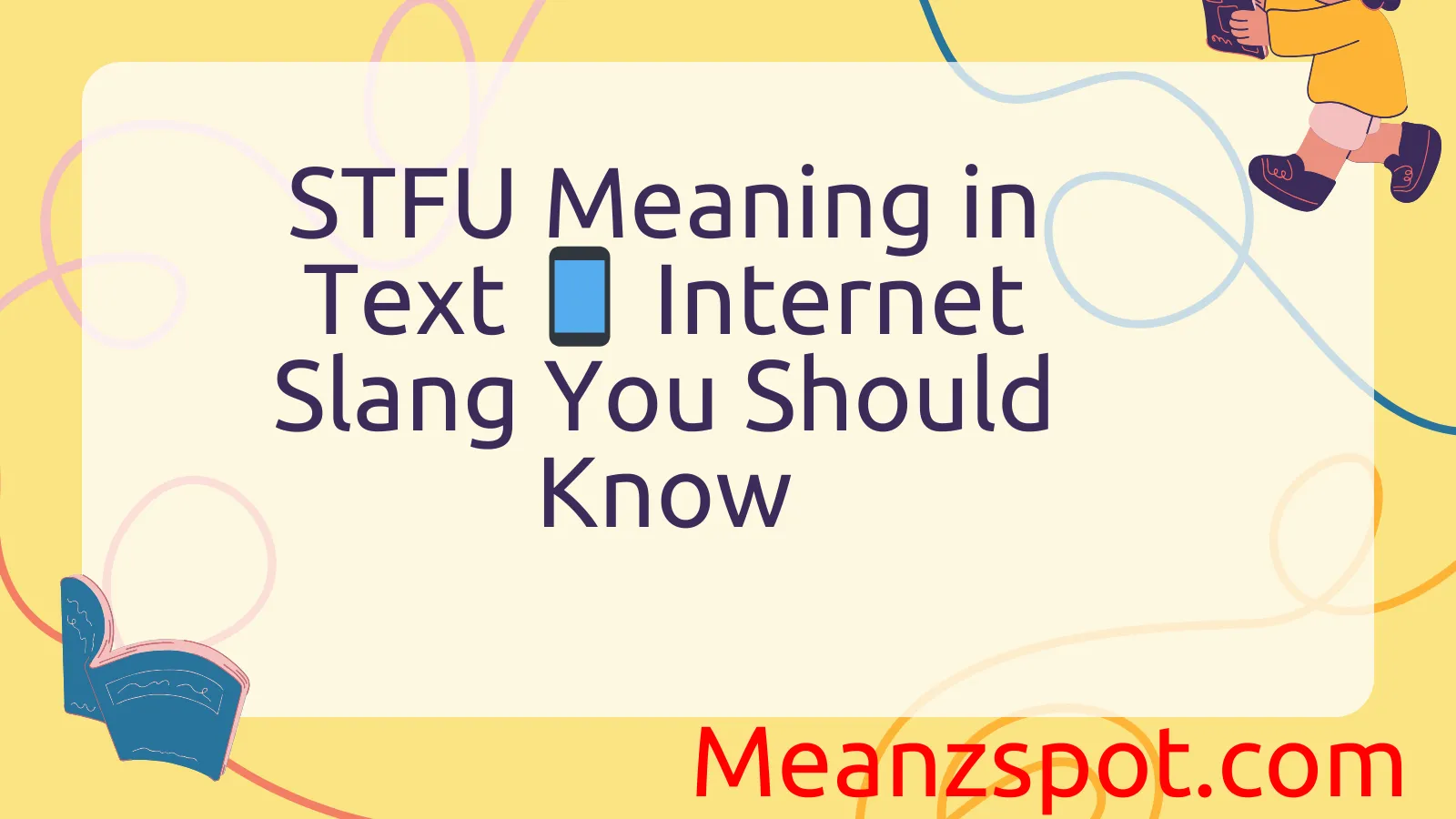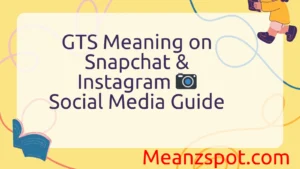If you’ve been scrolling through social media or texting with friends, chances are you’ve come across the abbreviation STFU. At first glance, it might look confusing, but in the world of online chats and memes, STFU is a widely used slang term. 💬 Simply put, it’s a blunt way of telling someone to be quiet or stop talking. While it can sometimes come across as rude, it’s often used in a joking or playful tone among friends.
From casual group chats to Twitter threads and gaming lobbies, you’ll see STFU pop up everywhere. This guide will break down the meaning of STFU in text, explain when it’s appropriate (and not appropriate) to use it, and share examples so you’ll always know how to respond. ✅
Definitions & Meaning
“STFU” is an acronym that stands for “Shut The F* Up.”** It is a vulgar and highly informal expression used to tell someone to be quiet, usually in a forceful or exasperated manner. The abbreviation is widely recognized online, especially in casual or heated exchanges.
The tone of “STFU” is generally aggressive or sarcastic. It’s often used when someone is annoyed, wants to stop a conversation, or is reacting strongly to someone else’s opinion. For example:
- “You don’t know what you’re talking about, STFU.”
- “STFU 😂 that’s the funniest thing I’ve heard all day!” (used sarcastically or playfully)
Though the phrase contains explicit language, the acronym form sometimes softens the impact for readers who are used to seeing it. Still, it’s important to note that it’s not considered polite or respectful language and is best avoided in formal settings.
Origins & History
The acronym “STFU” emerged during the early days of internet chat rooms and instant messaging in the late 1990s and early 2000s. As people sought quicker ways to express emotion and command attention online, abbreviations like “LOL” (laugh out loud), “BRB” (be right back), and “STFU” became widespread.
“STFU” likely gained traction through platforms like AOL Instant Messenger (AIM), IRC chats, and early message boards, where character limits and fast conversation styles encouraged shorter forms of speech. The acronym soon became a staple in online slang dictionaries and internet culture.
Its usage continued to evolve with the rise of social media platforms such as Twitter, Reddit, and YouTube. On these platforms, people used “STFU” not only in private messages but also in public comments and replies. Over time, it became part of the broader lexicon of digital sarcasm, trolling, and internet humor.
Usage in Different Contexts
Social Media:
“STFU” is commonly used on platforms like Twitter, Instagram, and TikTok, often in comments or memes. Depending on the tone, it can be used aggressively or jokingly. For example:
- “STFU, this is so relatable 😂”
- “If you don’t like it, STFU and scroll.”
Gaming Communities:
In multiplayer games or forums like Discord, players may use “STFU” during heated moments:
- “STFU and play the game.”
Pop Culture:
The term occasionally appears in TV shows, stand-up comedy, and music lyrics, either uncensored or implied. It serves as a reflection of internet culture entering mainstream entertainment.
Professional Settings:
Using “STFU” in professional or academic environments is highly inappropriate. It can be seen as offensive and unprofessional. Even in more relaxed workplaces that tolerate informal communication, this term is usually avoided.
Text Messaging & Chats:
Among close friends or in casual chats, “STFU” may be used playfully:
- “You got free tickets to the concert? STFU!!”
In this case, it expresses surprise or disbelief, not literal anger.
Context is everything when interpreting “STFU.” The same acronym can come off as either humorous or hostile, depending on the relationship between speakers and the tone of the conversation.
Common Misunderstandings & Clarifications
One common misunderstanding is assuming “STFU” always implies aggression. While the phrase it abbreviates is inherently rude, many people use “STFU” jokingly or even affectionately among friends. That said, it’s crucial to consider tone and context.
Another confusion arises from unfamiliarity with acronyms. Some might mistake “STFU” for a neutral phrase or try to guess its meaning based on similar letter groupings. This can lead to awkward misunderstandings if the recipient doesn’t realize how strong the phrase actually is.
It’s also important to clarify that “STFU” is not a constructive way to disagree or end a conversation. Using it can escalate arguments or damage relationships if not used carefully.
Clarification Tips:
- If you’re unsure how someone will take it, don’t use it.
- When used sarcastically, accompany it with emojis (e.g., 😂, 😭) to help convey tone.
- In mixed company or professional environments, avoid acronyms that could be interpreted as offensive.
Alternatives & Synonyms
If you’re looking for less abrasive ways to tell someone to stop talking or tone down the conversation, consider using alternatives. These can vary in tone from polite to humorous:
Polite Alternatives:
- “Could you please lower your voice?”
- “Let’s take a break from this topic.”
- “I think we should move on.”
Casual/Funny Alternatives:
- “Shush!”
- “Zip it!”
- “Quiet, you!” (used playfully)
Sarcastic/Friendly:
- “You talk too much 😂”
- “Omg, stop lol”
- “Save it for your diary!”
While these phrases don’t carry the same force as “STFU,” they can express the same general idea with more nuance and less risk of offense.
Frequently Asked Questions (FAQ)
1. What does “STFU” stand for?
“STFU” stands for “Shut The F*** Up,” a crude and forceful way to tell someone to be quiet.
2. Is “STFU” always offensive?
Not always. Among friends, it can be used jokingly, but it’s generally considered impolite and should be used with caution.
3. Can I use “STFU” in a professional setting?
No. It is highly inappropriate in work emails, meetings, or professional chats due to its vulgar nature.
4. Is “STFU” ever used positively?
Sometimes. People may use it in a playful or exaggerated way to express disbelief or amusement, like “STFU, that’s hilarious!”
5. What’s the difference between “STFU” and “shut up”?
“STFU” is more intense and includes profanity, while “shut up” can range from rude to joking, depending on context.
6. Are there safer alternatives to “STFU”?
Yes, such as “be quiet,” “calm down,” “shush,” or “let’s move on,” depending on tone and context.
7. Is it okay to use “STFU” in texting with friends?
It can be okay if your friends understand your tone and you share a casual rapport. Use emojis or context clues to avoid misunderstandings.
Conclusion
“STFU” is a widely recognized but controversial acronym that reflects the fast, informal, and emotionally expressive nature of online communication. While it can be humorous or exaggerated in friendly settings, it generally conveys a strong demand to stop talking and often carries a negative tone. Understanding its meaning, origins, and the context in which it’s used helps avoid miscommunication and conflict, especially in mixed or professional environments.
As with all slang, knowing when and where to use it is key. When in doubt, choosing a softer or clearer expression is usually the best way to keep conversations respectful and effective.



